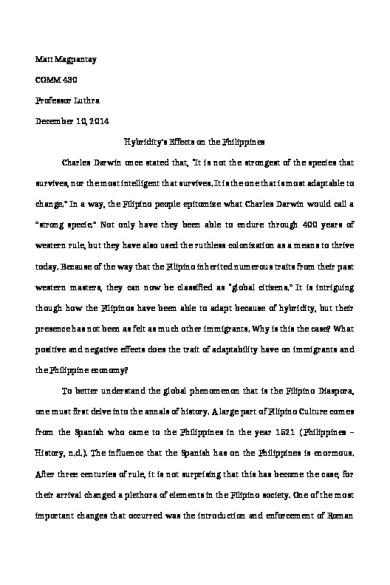Hybridity in the Philippines DOCX

| Title | Hybridity in the Philippines |
|---|---|
| Author | Matt Magpantay |
| Pages | 11 |
| File Size | 119 KB |
| File Type | DOCX |
| Total Downloads | 471 |
| Total Views | 750 |
Summary
Matt Magpantay COMM 430 Professor Luthra December 10, 2014 Hybridity’s Effects on the Philippines Charles Darwin once stated that, “It is not the strongest of the species that survives, nor the most intelligent that survives. It is the one that is most adaptable to change.” In a way, the Filipino pe...
Description
Matt Magpantay COMM 430 Professor Luthra December 10, 2014 Hybridity's Effects on the Philippines Charles Darwin once stated that, "It is not the strongest of the species that survives, nor the most intelligent that survives. It is the one that is most adaptable to change." In a way, the Filipino people epitomize what Charles Darwin would call a "strong specie." Not only have they been able to endure through 400 years of western rule, but they have also used the ruthless colonization as a means to thrive today. Because of the way that the Filipino inherited numerous traits from their past western masters, they can now be classified as "global citizens." It is intriguing though how the Filipinos have been able to adapt because of hybridity, but their presence has not been as felt as much other immigrants. Why is this the case? What positive and negative effects does the trait of adaptability have on immigrants and the Philippine economy? To better understand the global phenomenon that is the Filipino Diaspora, one must first delve into the annals of history. A large part of Filipino Culture comes from the Spanish who came to the Philippines in the year 1521 (Philippines – History, n.d.). The influence that the Spanish has on the Philippines is enormous. After three centuries of rule, it is not surprising that this has become the case, for their arrival changed a plethora of elements in the Filipino society. One of the most important changes that occurred was the introduction and enforcement of Roman...
Similar Free PDFs

Hybridity in the Philippines
- 11 Pages

Philippines in the 19th
- 9 Pages

Parenting in the Philippines
- 18 Pages

tagline in the Philippines
- 3 Pages

Colorism IN THE Philippines
- 1 Pages

Water Bodies in the PHILIPPINES
- 1 Pages

DRUG TESTING IN THE PHILIPPINES
- 51 Pages

The Philippines in ancient times
- 1 Pages

Fast Food in the Philippines
- 1 Pages

Major Religions in the Philippines
- 33 Pages

Airline Industry in the Philippines
- 32 Pages

First Mass in the Philippines
- 3 Pages
Popular Institutions
- Tinajero National High School - Annex
- Politeknik Caltex Riau
- Yokohama City University
- SGT University
- University of Al-Qadisiyah
- Divine Word College of Vigan
- Techniek College Rotterdam
- Universidade de Santiago
- Universiti Teknologi MARA Cawangan Johor Kampus Pasir Gudang
- Poltekkes Kemenkes Yogyakarta
- Baguio City National High School
- Colegio san marcos
- preparatoria uno
- Centro de Bachillerato Tecnológico Industrial y de Servicios No. 107
- Dalian Maritime University
- Quang Trung Secondary School
- Colegio Tecnológico en Informática
- Corporación Regional de Educación Superior
- Grupo CEDVA
- Dar Al Uloom University
- Centro de Estudios Preuniversitarios de la Universidad Nacional de Ingeniería
- 上智大学
- Aakash International School, Nuna Majara
- San Felipe Neri Catholic School
- Kang Chiao International School - New Taipei City
- Misamis Occidental National High School
- Institución Educativa Escuela Normal Juan Ladrilleros
- Kolehiyo ng Pantukan
- Batanes State College
- Instituto Continental
- Sekolah Menengah Kejuruan Kesehatan Kaltara (Tarakan)
- Colegio de La Inmaculada Concepcion - Cebu



